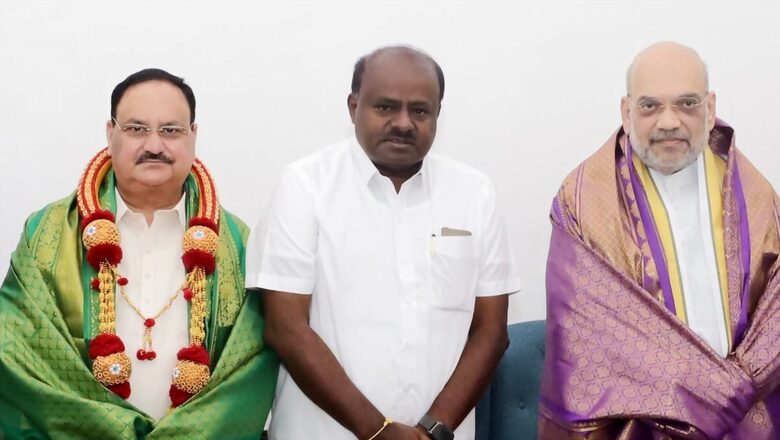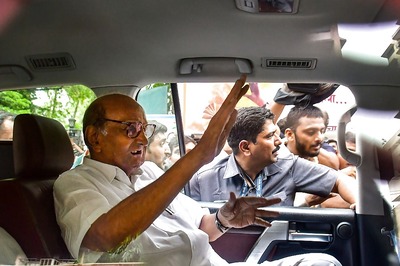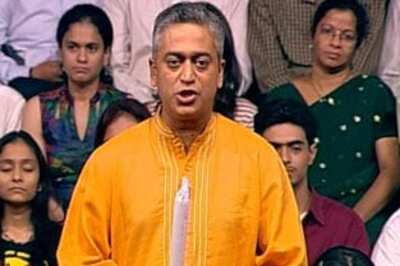
views
The Janata Dal-Secular (JDS) will seek at least six of the 28 Lok Sabha seats in Karnataka, as part of the recently forged alliance with the Bharatiya Janata Party (BJP), News18 has learned.
In the 2019 elections, the BJP had won 25 seats, while the Congress and JDS won one each. One seat was won by Sumalatha Ambareesh, who contested as an independent candidate and won from the Mandya Lok Sabha constituency.
In this election, Sumalatha has already announced her decision to align with the National Democratic Alliance (NDA).
“We are asking for around six seats as part of this alliance," confirmed JDS spokesperson TA Sharavana, adding that the decision on seat-sharing, names of candidates to be fielded by the JDS and other details will be decided in the second round of meetings between the JDS high command and the BJP top leadership.
JDS’s SURVIVAL STRATEGY
This alliance seems to be a survival strategy for the JDS, especially given its recent electoral setback in the state assembly polls, where it secured only 19 seats and a 13% vote share.
Senior leaders of the regional party acknowledge that the decision to go with the BJP is primarily to “redeem" itself, but the not-so-new partnership is also strategically aimed at bolstering the BJP’s prospects in the upcoming Lok Sabha elections.
The decision for HD Deve Gowda’s family-led JDS to formally join the BJP-led NDA followed careful deliberations between these ideologically diverse parties. The BJP envisions this alliance as a means to mitigate losses in regions traditionally dominated by the JDS, eventually expanding its own voter base.
Key BJP leaders namely former Chief Ministers BS Yediyurappa and Basavaraj Bommai described the alliance as a “political game-changer" in Karnataka and emphasised that the inclusion of parties like the JDS will further help strengthen the NDA to fight their common target – the Congress.
The JDS and BJP have collaborated in the past and formed a coalition government in Karnataka back in 2006, when the BS Yediyurappa-led BJP state unit decided on a 20-20 month formula to govern the state. HD Kumaraswamy was made the Chief Minister for the first 20 months, but on completion of the tenure, the coalition collapsed as the BJP claimed the JDS refused to hand over power. Having faced this once, the BJP had campaigned against the JDS, calling them “traitors" in the subsequent assembly election.
Met Former Chief Minister of Karnataka and JD(S) leader Shri H.D. Kumaraswamy in the presence of our senior leader and Home Minister Shri @AmitShah Ji.I am happy that JD(S) has decided to be the part of National Democratic Alliance. We wholeheartedly welcome them in the NDA.… pic.twitter.com/eRDUdCwLJc— Jagat Prakash Nadda (@JPNadda) September 22, 2023
‘INDIA’S DEVELOPMENT’ & VOKKALIGA FACTORS
The current alignment signifies a distinct phase in the regional party’s political trajectory, but more so the BJP’s efforts to consolidate its Vokkaliga vote bank, which did not vote in their favour in the May assembly polls.
BJP insiders say the party plans to contest at least 25 seats, but with the new arrangement with the JDS and their demand for at least six seats, it may turn out to be a speed bump in the BJP-JDS alliance.
When asked how comfortable JDS leaders will be with this alliance, as two of their state leaders resigned soon after the JDS-BJP announced their tie-up, Sharavana said that the decision was taken “in the interest of India’s development".
“Under the leadership of PM Modi, we are convinced that India will develop in leaps and bounds. All countries are looking at India today and how we have developed as a nation. There is no unity under the coalition I.N.D.I.A, and we know they will not be able to get the people’s mandate. In 2024, if Modi ji is elected as the PM again, then nobody can stop him. We are now part of the NDA, and the Congress is our opposition here," the spokesperson said.
On a question about the JDS being one of the allies of the Third Front in 2019, which was opposed to the NDA, but today has decided to forge an alliance with them, the JDS says that the “political scenario and circumstances are different" this time.
The Third Front, comprising like-minded regional parties who were not part of the UPA or NDA such as the JDS, CPM, BSP, AIADMK, BJD, TDP, etc., formed an alliance before the 2009 elections. “We are opposed to the Congress. There is no development in Karnataka since the Congress came to power. The schemes they have announced at the cost of taxpayers’ money, the random transfer of government officials, and high level of corruption in the Congress government firmed our decision to join the NDA. It is also the best decision for the survival of our party," Sharavana added.
#WATCH | Former Karnataka CM and JDS leader HD Kumaraswamy meets Union Home Minister Amit Shah in Delhi. JDS to formally join the National Democratic Alliance (NDA). BJP President JP Nadda and Goa CM Pramod Sawant are also present during the meeting. pic.twitter.com/7SpdnoWFSJ
— ANI (@ANI) September 22, 2023
CONGRESS: THE COMMON ENEMY
Senior political analyst Sandeep Shastri talks about how the BJP has previously benefited from the Janata Dal’s voter base, as seen in the shift of the Lingayat vote bank to the BJP in 1998-99, when the Lok Shakti Party, led by ex-Chief Minister Ramakrishna Hegde, aligned with the BJP.
“Undoubtedly, the JDS-BJP alliance is a marriage of convenience. The fact that they both have a common enemy in the Congress has brought them together. Both want to avenge the loss they suffered at the hands of the Congress and they think the best way was by joining hands," Shastri said.
In the context of the upcoming Lok Sabha elections, where the BJP seeks to maintain its strong position, even at the cost of giving away a few seats as the sacrifice, could help the BJP leverage the JDS’s influence over the Vokkaliga voter base in its favour and establish a foothold in the Old Mysuru Region, a territory that has been elusive to the BJP until now.
Shastri says the BJP has a long-term plan. “The other advantage to the BJP is that the party has been more successful in getting votes transfers from an alliance partner, without its vote being transferred to its alliance partner," he pointed out.
The BJP wants Karnataka to be a state with a bipolar contest. By aligning with the JDS, the BJP is looking at the Vokkaliga vote bank shifting in its favour, while keeping its traditional voters intact. This is because traditional BJP supporters are ideologically embedded, so they would not vote in favour of another party, but would rather abstain than vote for an ally, the analyst explained.




















Comments
0 comment